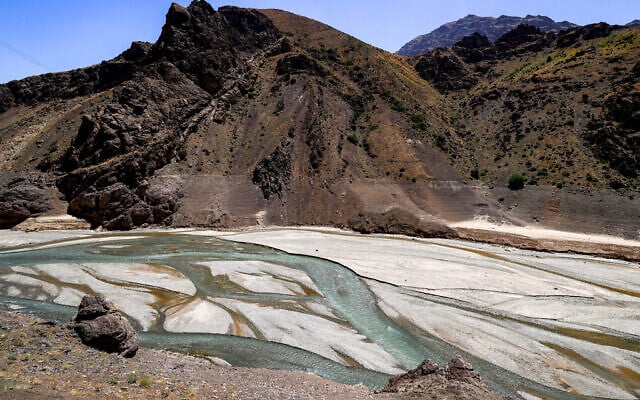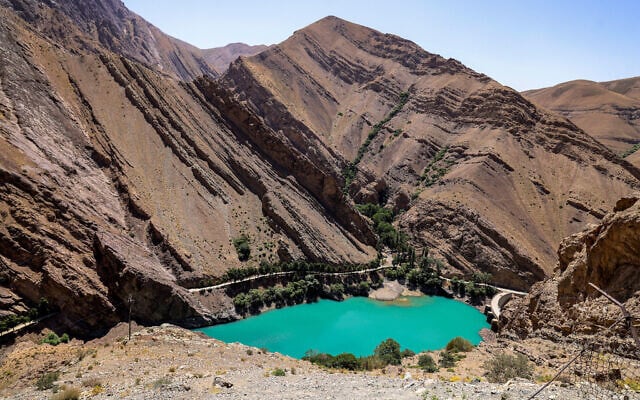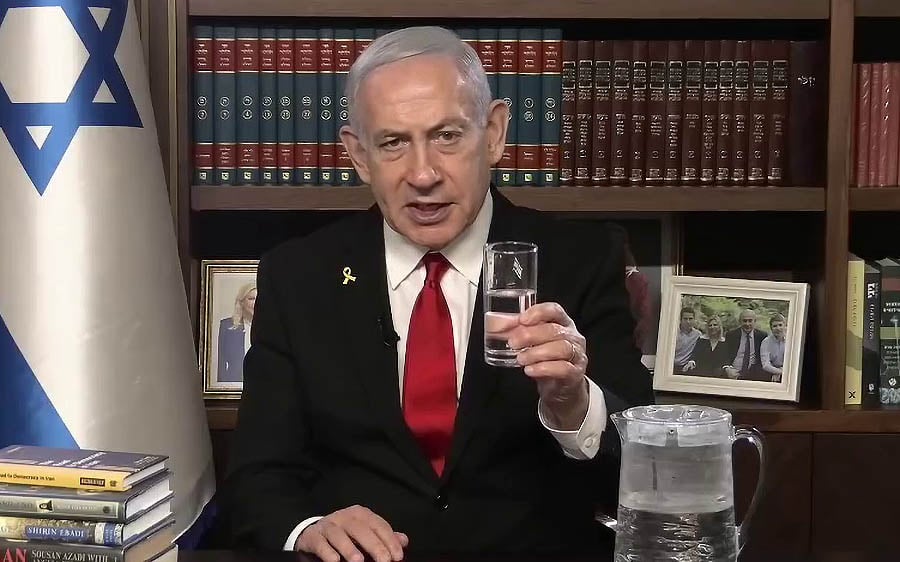Prime Minister Benjamin Netanyahu posted a video statement to social media on Tuesday in a direct address to the Iranian people, calling on them to oppose their regime, and promising that Israeli water technology will flow into the country once the regime is deposed, after the Islamic Republic’s president lamented Iran’s water shortage.
“Greetings from Jerusalem, To the proud people of Iran. Your leaders forced the 12 Day War on us, and they lost miserably,” Netanyahu said, referring to the war Israel launched in June, after assessing that the nuclear and ballistic missile programs of Iran, which regularly threaten to destroy Israel, posed an imminent and existential threat to the Jewish state.
“They lie through their teeth, but on rare occasions, they tell the truth,” Netanyahu continued, and paraphrased Iranian President Masoud Pezeshkian: “We have problems with water, electricity, money and inflation – where don’t we have a problem? There won’t be any water in the dams by September or October.”
“He’s right. Everything is collapsing,” Netanyahu said. “In this brutal summer heat, you don’t even have clean, cold water to give your children.”
Authorities in Tehran have reduced water pressure to manage falling reservoir levels, as the country endures what Iranian media have described as the worst drought in a century.
Get The Times of Israel’s Daily Edition
by email and never miss our top stories
By signing up, you agree to the terms
The country has faced drought conditions for the last five years, according to the director of the Environmental Protection Organization, Sheena Ansari, and the Meteorological Organization recorded a 40% drop in rainfall over the last four months compared to a long-term average.
Last week, Iranian authorities ordered many government offices closed in a bid to cut power consumption as a heatwave strains generating capacity, state media reported.

A picture taken on June 1, 2025, shows the low water inlet of the river upstream of the Amir Kabir dam along the Karaj river in Iran’s northern Alborz mountain range. (Photo by ATTA KENARE / AFP)
Elevated temperatures that began in mid-July have strained Iran’s power grid, prompting rolling blackouts nationwide. The frequent power outages have severely affected industrial output.
Reformist newspaper Shargh reported that factories were now facing four days a week of power cuts, compounding pressure from crippling Western sanctions and soaring inflation.
“To live like this is not fair to you. It’s not fair to your children. But I have very good news: Israel is the #1 recycler of water in the world. We recycle 90% of our waste-water. And we lead the world in desalination. We know exactly what to do so Iran can also have plentiful water,” he continued.
The premier noted that in 2018, Israel opened a Persian-language Telegram account teaching water management techniques, and said “100,000 Iranians joined almost instantly,” adding: “The thirst for water in Iran is only matched by the thirst for freedom.”
PM Netanyahu to the people of Iran:
As our founding father, Theodor Herzl, said of the Jewish state, “If you will it, it is no dream”
And I say to you, “if you will it, a free Iran is no dream.”
Now is the time for action.
Now is the time to fight for freedom.
Iran Baraye Irani pic.twitter.com/0piWqVO8EJ
— Prime Minister of Israel (@IsraeliPM) August 12, 2025
“The moment your country is free, Israel’s top water experts will flood into every Iranian city, bringing cutting-edge technology and know-how. We will help Iran recycle water, we’ll help Iran desalinate water,” Netanyahu said.
“The tyrants of Tehran preferred sending hundreds of billions of dollars not to you, to Hamas, Hezbollah, to the Houthis,” he said, referring to the Islamic Republic’s proxy terror groups in Gaza, Lebanon, and Yemen, which attacked Israel on and after October 7, 2023. “It doesn’t have to be this way. I urge you to be bold and brave – to dare to dream.
Take risks for freedom. For your futures. For your families. It’s worth it! Take to the streets. Demand justice. Demand accountability. Protest tyranny,” he said.
“As our founding father, Theodor Herzl, said, [of the Jewish state], ‘If you will it, it is no dream.’ And I say to you, if you will it, a free Iran is no dream,” Netanyahu concluded, and signed off with a Persian protest slogan.
Bennett echoes PM’s statement: ‘Iran has a choice’
Former premier Naftali Bennett, who is widely expected to be Netanyahu’s main rival when the next elections come, published his own video statement, expressing the same sentiment.
پیام ویژه به مردم تشنهٔ ایران
מסר מיוחד לעם האיראני הצמא
A special message to the thirsty Iranian people pic.twitter.com/r15CXTW7xn
— Naftali Bennett נפתלי בנט (@naftalibennett) August 12, 2025
“Dear Iranian people, your poets once sang of flowing rivers and beautiful gardens. But those rivers and gardens are dry today. Iran is out of water. But it doesn’t have to be this way. You see, in the land of Israel, we have even less water, but de facto, we have an abundance of water,” he said, touting Israel’s recycling and desalination programs.
“We would love to share this with you. Your current leadership prefers to spend your money on bombs, on terror, on missiles, instead of on water and abundance for you. Iran has a choice: It can choose to continue the war, or it can choose peace. It can choose the way of working together,” he said.
“One day, in not a distant future, Israel will be happy to share all of our technologies with the beautiful Iranian people, so from this friendship, we’ll see springs of clear water,” Bennett concluded.

The reservoir behind the Amir Kabir dam along the Karaj river is pictured in Iran’s northern Alborz mountain range on June 1, 2025. Tehran is facing a water shortage due to low rainfall last year and the beginning of summer. (Photo by ATTA KENARE / AFP)
A heat wave and drought, combined with decades of poor water management, have led to a serious water shortage in Iran, with water turned off for up to 48 hours in some cities, according to DW.
Early this month, Pezeshkian warned: “In Tehran, if we cannot manage and people do not cooperate in controlling consumption, there won’t be any water in dams by September or October.”
Iran is also struggling with electricity and gas shortages.
